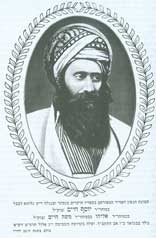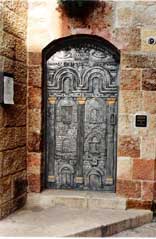Reflections
The Ben Ish Chai
The undisputed leader of his time – he lived in Baghdad, but his net spread over all Eastern Jewry
Indeed, the boy kept to his word, and it was as though he grew up several years in one instant. He shunned the games of the children around him, slept and ate little and devoted himself exclusively to the study of Torah for most of the day. At first he studied under the guidance of his uncle, his mother’s brother Reb Dovid Chai Ben Meir. Later, in the year 5608 (1848), he entered the Yeshiva ‘Medrash Beis Zilca’ led by the Gaon R’ Abdallah (Ovadia) Somech. It was during that year that he gained his reputation as a “wonder-child”, when he anonymously penned a concise and detailed response to a Halachic question his father had received from the Rabbanim of Yerushalyim. From then on he was the address for many a Halachic query, and the young Yosef Chaim did not turn away his questioners empty handed.
A number of years passed, and Reb Yosef Chaim left Yeshivas ‘Medrash Beis Zilca’ and secluded himself in the attic of his home, where he acquired enormous levels of knowledge - both in the hidden and revealed parts of the Torah. At the age of eighteen his Rebbe, Rav Abdalla (Ovadia) Somech chose him as a husband for his sister Rachel, daughter of the Tzaddik Reb Yehuda Somech. From then onwards, Reb Yosef Chaim continued to grow tremendously in his Torah knowledge and purity.
On the 7th Elul 5616 (1856) Reb Yosef Chaim’s saintly father passed away, at the early age of fifty two. On the seventh day of Aveilus (mourning) young Yosef Chaim arose to eulogize his father. From his poignant words and brilliant oratory, it was clear that he would continue in his father’s legacy and the leaders of the town appointed him to take his place. The radiant light of the Ben Ish Chai began to shine over the Jews of Iraq, illuminating the path for all the Jews of his time. He was recognized as the ‘Gadol haDor’ (leader of the generation), even though he didn’t hold any official position of Rabbanus and was ‘merely’ an orator, as his father was before him.
His speeches drew large crowds, and his resonant and powerful voice could be heard from afar. His presentation was profoundly articulate, and his narration riveting. Every Shabbos afternoon, before ‘Seuda Shlishis’ (the third meal of Shabbos), he would deliver a fiery discourse on the weekly parsha in the “Tzlat lazgiri” (the small shul). The Shul would fill up to the rafters, and for three hours consecutively the assembled would listen as he skillfully wove together a tapestry of excerpts from chaza”l, Midrashim and soul-stirring stories. Interspersed here and there he would include some timely Halachic insights; this was his way of penetrating the hearts of his listeners with the words of Halacha. Upon the climatic conclusion of his discourse, the inspired crowds would daven an uplifting Mincha, and then escort their Rav to his home for the third Seuda of Shabbos.
The Ben Ish Chai delivered discourses during the week as well. Each day after Shacharis, whilst still wrapped in his Tallis and wearing his Tefillin, he would deliver a Shiur on Shulchan Aruch ‘Orach Chaim’ and ‘Yoreh Deah’, and afterwards another Shiur that would continue for an hour- and a half, with Aggados from Chazal in Talmud Bavli. He based his teachings on the Sefer ‘Ein Yaakov’, as his father had done before him. Every four years he would complete the entire Shas in his lectures. The daily Shiur was delivered each morning without fail, for over fifty years. During the Shiur Reb Yosef Chaim was like a gushing fountain, spouting forth endless Chidushim both in the hidden and revealed Torah. These Chiddushim appear in his Sefer ‘Ben Yehoyada’, which was printed during his lifetime. After this Sefer was printed he wrote down many more Chiddushim; some of these he merited to publish in his Sefer ‘Benayahu’, and the rest were brought to Eretz Yisrael by his grandson Reb David (son of his son Reb Yaakov) amid great self-sacrifice – as he wrote later: “I recited Shir haMaalos and Lamnatze’ach a thousand times until they arrived safely in Eretz Yisrael”. Once in the holy Land, the precious manuscripts were printed and published.
Despite the fact that Reb Yosef Chaim held no official title or position, he nevertheless made a major impact on the customs and Halachos of Eastern Jewry. He instated countless rulings, composed hundreds of ‘Piyutim’ (poems), Tefillos and prayers of supplication. All these were unequivocally accepted, by all Jews the world over. Amongst his numerous and stirring Piyutim, the most famous and beloved by far is the Piyut he composed by the gravesite of Rebbe Shimon bar Yochai in Meron: ‘V’amartem Koh l’Chai, Rebi Shimon bar Yochai’.
Reb Yosef Chaim was known as the uncontested leader of the Jews in the Eastern lands, and the superior authority on all matters of import. He acted as arbitrator in public matters between Eastern Jewry. His was the last word, and his remarkable wisdom and outstanding genius was apparent in all major decisions on behalf of the Klal.
In the year 5629 (1869) Reb Yosef Chaim visited the Holy Land. When he came to a place called ‘Kfar Avanis’, the burial site of Benayahu ben Yehoyada (army general of Shlomo haMelech and head of the Sanhedrin), he felt a distinctive aura, and understood that his soul lay rooted in the soul of Benayahu ben Yehoyada. There and then he decided to name his Sefarim after this great personality: ‘Benayahu’, ‘Ben Yehoyada’, ‘Ben Ish Chai’, ‘Ben Ish Chayil’, ‘Rav Pe’alim’, and ‘Mekabzael’.
In the month of Elul 5669 (1909) Reb Yosef Chaim travelled to Kfar Kafil, to prostrate himself by the grave of Yechezkel the Navi. He stayed there for an entire week, and composed many Tefillos and supplications. On Motzaei Shabbos he began to feel unwell, and two days later, on the 13th of Elul, his pure untainted soul rose to the Heavens.
Reb Yosef Chaim left us a precious heritage, in the form of his many Sefarim – great in quantity and immeasurable in quality. He wrote on every subject in the Torah, and of his many manuscripts forty Sefarim were printed. Another eighty Sefarim still remain in handwritten manuscripts, and have yet to be published. His style is light and easy to read, alluring and absorbing, and written in a clear and elucidating manner. Each one of his Sefarim were received with enthusiasm and warmth by Jews from all over the world. His Sefer ‘Ben Ish Chai’ is the most widespread of all, and most refer to the Tzaddik Reb Yosef Chaim by this name, the ‘Ben Ish Chai’. The Sefer is a collection of his many discourses on the weekly Parsha, which he arranged in order to learn from each week for the duration of two years. The first volume is called ‘Shana Rishona’ (the first year), and the second volume is ‘Shana Shniyah’ (the second year). This Sefer serves as the ‘Shulchan Aruch’ for Eastern Jewry, and many have the custom to learn from it in a group, from beginning to end, and afterwards – to start again…







